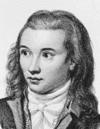- Novalis
-
/noh vah"lis/, n.(pen name of Friedrich von Hardenberg), 1772-1801, German poet.
* * *
born May 2, 1772, Oberwiederstedt, Prussian Saxonydied March 25, 1801, Weissenfels, SaxonyGerman Romantic poet and theorist.Born into a noble family, he took his pseudonym from a former family name. He studied law and then mining and in 1799 became a mine inspector. His beautiful Hymns to the Night (1800) expresses his grief on the death of his young fiancée. In his last years before his own death from tuberculosis at age 28, he drafted a philosophical system based on idealism and produced his most significant poetic work. His mythical romance Heinrich von Ofterdingen (1802) describes a young poet's mystical and romantic searchings. Novalis, detail of an engraving by Edouard Eichens, 1845By courtesy of the Staatliche Museen zu Berlin, Germany; photograph, Walter Steinkopf
Novalis, detail of an engraving by Edouard Eichens, 1845By courtesy of the Staatliche Museen zu Berlin, Germany; photograph, Walter Steinkopf* * *
▪ German poetpseudonym of Friedrich Leopold, Freiherr von (baron of) Hardenbergborn May 2, 1772, Oberwiederstedt, Prussian Saxony [Germany]died March 25, 1801, Weissenfels, Saxony [Germany]early German Romantic poet and theorist who greatly influenced later Romantic thought.Novalis was born into a family of Protestant Lower Saxon nobility and took his pseudonym from “de Novali,” a name his family had formerly used. He studied law at the University of Jena (1790), where he became acquainted with Friedrich von Schiller (Schiller, Friedrich von), and then at Leipzig, where he formed a friendship with Friedrich von Schlegel (Schlegel, Friedrich von) and was introduced to the philosophical ideas of Immanuel Kant (Kant, Immanuel) and Johann Gottlieb Fichte (Fichte, Johann Gottlieb). He completed his studies at Wittenberg in 1793, and in 1796 he was appointed auditor to the Saxon government saltworks at Weissenfels.In 1794 Novalis met and fell in love with 12-year-old Sophie von Kühn. They were engaged in 1795, but she died of tuberculosis two years later. Novalis expressed his grief in Hymnen an die Nacht (1800; Hymns to the Night), six prose poems interspersed with verse. In this work Novalis celebrates night, or death, as an entry into a higher life in the presence of God and anticipates a mystical and loving union with Sophie and with the universe as a whole after his own death. In 1797 he went to the Academy of Freiberg to study mining. Novalis became engaged (to Julie von Charpentier) in 1798, and a year later he became a mine inspector at the saltworks at Weissenfels. He died of tuberculosis in 1801.Novalis's last years were astonishingly creative, filled with encyclopaedic studies, the draft of a philosophical system based on idealism, and poetic work. Two collections of fragments that appeared during his lifetime, Blütenstaub (1798; “Pollen”) and Glauben und Liebe (1798; “Faith and Love”), indicate his attempt to unite poetry, philosophy, and science in an allegorical interpretation of the world. His mythical romance Heinrich von Ofterdingen (1802), set in an idealized vision of the European Middle Ages, describes the mystical and romantic searchings of a young poet. The central image of his visions, a blue flower, became a widely recognized symbol of Romantic longing among Novalis's fellow Romantics. In the essay Die Christenheit oder Europa (1799; “Christendom or Europe”), Novalis calls for a universal Christian church to restore, in a new age, a Europe whose medieval cultural, social, and intellectual unity had been destroyed by the Reformation and the Enlightenment.Additional ReadingKristin Pfefferkorn, Novalis: A Romantic's Theory of Language and Poetry (1988); Wm. Arctander O'Brien, Novalis: Signs of Revolution (1995); Veronica G. Freeman, The Poetization of Metaphors in the Work of Novalis (2006).* * *
Universalium. 2010.
